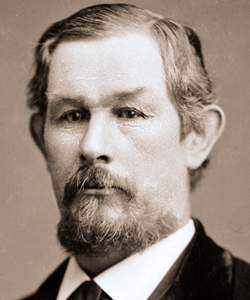Eppa Hunton (Congressional Biographical Directory)
Reference
HUNTON, Eppa, a Representative and a Senator from Virginia; born near Warrenton, Fauquier County, Va., September 22, 1822; attended New Baltimore Academy; taught school three years; studied law; admitted to the bar in 1843 and commenced practice in Brentsville, Va.; served as colonel, and later general, in the Virginia militia; Commonwealth attorney for Prince William County 1849-1861; member of the Virginia convention at Richmond in February 1861 and advocated secession; entered the Confederate Army as colonel of the Eighth Regiment, Virginia Infantry; promoted to brigadier general after the Battle of Gettysburg and served through the remainder of the Civil War; resumed the practice of law; elected as a Democrat to the Forty-third and to the three succeeding Congresses (March 4, 1873-March 3, 1881); was not a candidate for renomination in 1880; chairman, Committee on Revolutionary Pensions (Forty-fourth Congress), Committee on the District of Columbia (Forty-sixth Congress); appointed a member of the Electoral Commission created by act of Congress in 1877 to decide the contests in various States in the presidential election of 1876; resumed the practice of law; appointed and subsequently elected as a Democrat to the United States Senate to fill the vacancy caused by the death of John S. Barbour and served from May 28, 1892, to March 3, 1895; was not a candidate for renomination in 1894; resumed the practice of law in Warrenton, Va.; died in Richmond, Va., October 11, 1908; interment in Hollywood Cemetery.
"Hunton, Eppa," Biographical Directory of the United States Congress, 1774 to Present, http://bioguide.congress.gov/scripts/biodisplay.pl?index=H000999.





